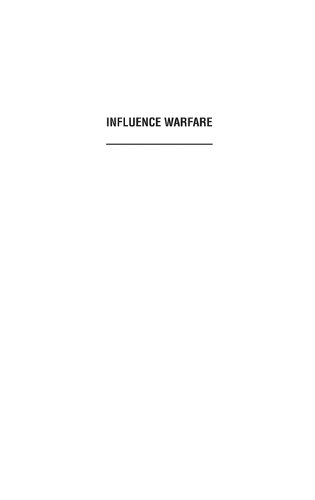
Influence Warfare: How Terrorists and Governments Fight to Shape Perceptions in a War of Ideas
(Hardback)
Publishing Details
Influence Warfare: How Terrorists and Governments Fight to Shape Perceptions in a War of Ideas
By (Author) James J. F. Forest
Bloomsbury Publishing PLC
Praeger Publishers Inc
14th May 2009
United States
Classifications
Tertiary Education
Non Fiction
Theory of warfare and military science
363.325
Physical Properties
Hardback
392
Description
This important work, edited by an expert on terrorism, focuses on the 21st-century struggle for strategic influence and ways in which states can neutralize the role of new media in spreading terrorist propaganda. In an era where anyone can have access to the Internet or other media forms that make widespread communication easy, terrorists and insurgents can spread their messages with complete freedom, creating challenges for national security. Influence Warfare: How Terrorists and Governments Fight to Shape Perceptions in a War of Ideas focuses on the core of the ongoing struggle for strategic influence and, particularly, how states can counter the role media and the Internet play in radicalizing new agents of terrorism. As the book makes clear, governments need to find ways to effectively confront non-state adversaries at all levels of the information domain and create an understanding of strategic communications within a broad range of technologies. The essays from the international group of authors who contributed to this work offer a deeper understanding of the ongoing struggle. Influence Warfare also provides a set of case studies that illustrate how the means and methods of strategic influence can impact a nation's security.
Reviews
In this work, international contributors examine ways to confront terrorists and insurgents in the information domain. The book begins with an introductory chapter defining key terms and concepts. The first part of the book provides critical analyses, thematic essays, and examples of how terrorists gain and lose strategic influence. In the next section, contributors focus on the counterterrorism aspects of influence warfare, particularly how governments gain and lose strategic influence. The final section describes cases, such as US strategic communication efforts during the Cold War, the information operations war between Israel and Hezbollah during the summer of 2006, and strategic uses of the Internet by Hizbut Tahrir-Indonesia. * Reference & Research Book News *
Overall, the work contains a snapshot of current thinking on strategic communication in an age of new media. Summing Up: Recommended. Upper-division undergraduates and above. * Choice *
Author Bio
James J. F. Forest is director of terrorism studies and associate professor in the Combating Terrorism Center at West Point, The U.S. Military Academy, West Point, NY. He has published over ten books on terrorism and counterterrorism, in addition to numerous articles and commentaries. His books include the Praeger Security International titles Countering Terrorism and Insurgency in the 21st Century: International Perspectives (2007), Homeland Security: Protecting America's Targets (2006), and The Making of a Terrorist: Recruitment, Training, and Root Causes (2005).
